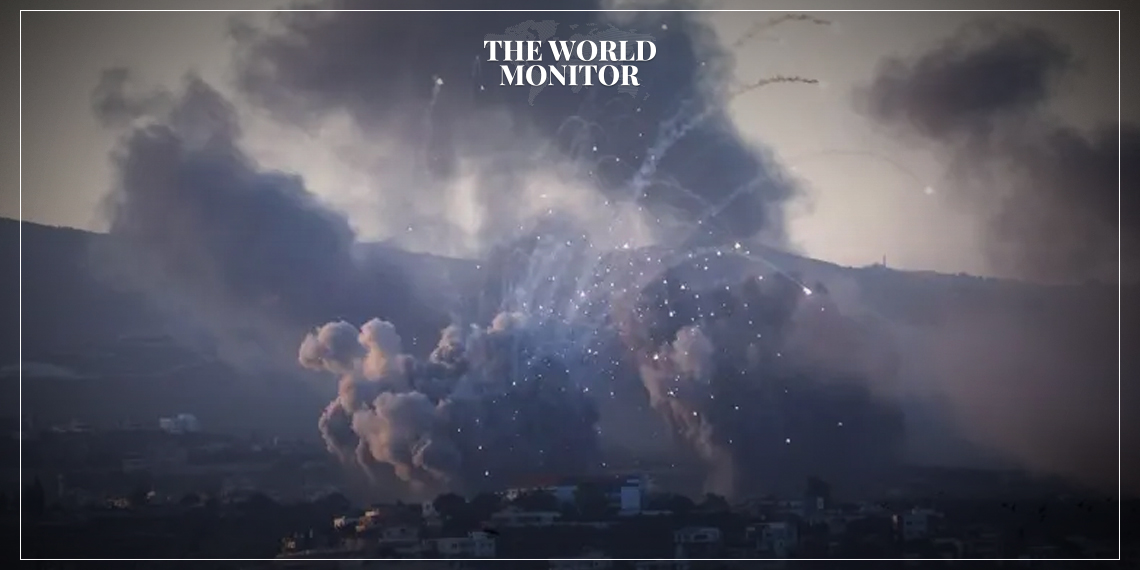Israeli airstrikes resumed today, Tuesday, on the Baalbek-Hermel region including Nabi Sheet, Taliya, and Shmistar in eastern Lebanon, as reported by Al Arabiya and Al Hadath correspondents.
Israel carried out a series of morning raids on the Lebanese Beqaa, affecting villages in the Baalbek district including Nabi Sheet, Dours, Sha’at, and Hermel, following a long, bloody night of displacement accompanied by the broadest Israeli air invasion since the 2006 war.
Israel announced today that it had targeted dozens of Hezbollah sites overnight across various regions in southern Lebanon. The Israeli military stated, “During the night, the Israeli Air Force hit dozens of Hezbollah targets in several areas in southern Lebanon,” adding that its artillery and tanks also struck additional “targets” in the area of Aita al-Shaab and Ramiya.
Rocket barrages were launched from southern Lebanon towards many areas in northern Israel including the Galilee and Haifa Bay. Al Arabiya and Al Hadath correspondents reported that Hezbollah claimed responsibility for targeting Kiryat Shmona with rockets. Additionally, several rockets were intercepted while others landed in open areas. It was reported that the Ramat David base in the Jezreel Valley was targeted, as well as the Golani military base in Lower Galilee.
Israeli reports mentioned rockets intercepted over the Afoula area, while Israeli media reported that nine injured individuals were admitted to the Galilee Medical Center in Nahariya this morning. Alarm sirens were triggered again this morning in Nahariya, later attributed to a rocket interception, while two rockets fell into the sea.
Hezbollah announced that its fighters had struck the Megiddo military airport west of Afoula with Fadi 1 and Fadi 2 rockets, as well as the Ramat David base and airport with Fadi 2 rockets. Earlier, Hezbollah’s media reported targeting an explosives factory 60 kilometers inside Israeli borders, while Israel stated that more than 50 rockets were launched from Lebanon this morning towards the north, with most being intercepted.
According to “Yedioth Ahronoth,” an Israeli official stated that Tel Aviv still has thousands of targets it could strike in Lebanon. The official added that Israel is waiting for Hezbollah to retreat or face more strikes, noting that the confrontation with Hezbollah will take time.
Since the early hours of yesterday until late last night, Israeli warplanes launched hundreds of raids, sparing no village or town in southern, northern, and western Beqaa, extending to the regions of Jebail, Lassa, and Kesrouan before striking again in the southern suburbs in an attempt to assassinate Ali Karaki, the official responsible for the southern front in Hezbollah, who later survived and was moved to a safe location.
This was accompanied by a massive wave of displacement from the south towards Beirut, trapping thousands in their cars until midnight.
In response, Hezbollah expanded its rocket attacks targeting Israeli locations and bases from northern settlements to Tiberias, the Golan, Afoula, Safed, Haifa, and many other cities and settlements in the Israeli interior, reaching as far as 120 kilometers from the border, targeting settlements in the West Bank east of Tel Aviv for the first time.
Hundreds of Israeli airstrikes on Hezbollah targets across various areas in Lebanon resulted in 492 fatalities, including 35 children, according to Lebanese authorities, marking the most severe aerial bombardment ever targeting this country since the onset of cross-border fire about a year ago amid the Gaza war.
The Lebanese Ministry of Health reported that at least 492 people were killed and 1,645 others injured in the Israeli airstrikes on Lebanon, including 35 children and 58 women.
Israeli Defense Minister Yoav Gallant stated that the Israeli airstrikes in Lebanon destroyed tens of thousands of Hezbollah’s rockets, exacerbating the tragedies faced by the Iran-backed group, marking the toughest period in its history.
The Israeli military announced that it had named its military operation against Hezbollah “Arrows of the North,” noting that it had targeted 1,600 Hezbollah sites on its first day.
In related developments, the Lebanese Cabinet is holding an emergency session today to discuss the crisis following the arrival of French envoy Jean-Yves Le Drian to Beirut yesterday afternoon, who began his visit with a meeting with the Lebanese Army Commander, General Joseph Aoun, and is scheduled to meet sequentially in the coming hours with the Speaker of the Parliament Nabih Berri, Prime Minister Najib Mikati, and Patriarch Rai among other political leaders.
UN Secretary-General Antonio Guterres expressed “deep concern” about the escalation and the “large number of civilian casualties” in Lebanon. Meanwhile, Josep Borrell, the European Union’s foreign policy chief, described the escalation between Israel and Hezbollah in Lebanon as almost a total war, telling reporters, “The situation is very serious and concerning. I can say that we are facing almost a total war.”






